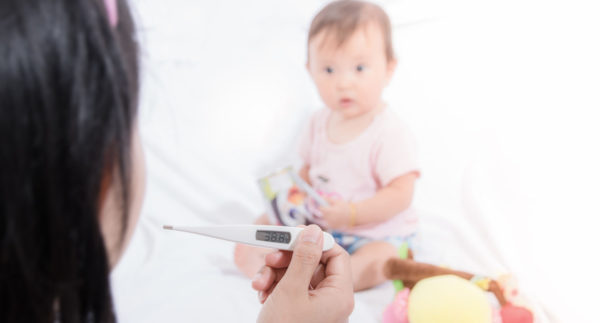Viral infections are highly contagious and are easily spread among children. Young children who spend time in childcare settings are especially vulnerable to these illnesses. Fortunately, many have mild symptoms.
In this chapter, learn about the flu, chickenpox, hand-foot-mouth disease, fifth disease and roseola. We’ll explain which symptoms you need to look for and how to prevent these common viral infections.
Flu (Influenza)
The flu is much more than a runny nose and sore throat. The virus can be an extremely dangerous illness for young children and causes some 20,000 children under the age of 5 to be hospitalized every year.
The flu virus creates infections in your baby’s nose, throat and lungs that have symptoms similar to upper and lower respiratory infections. The most serious complications for babies include pneumonia and dehydration.
Symptoms of Flu
There are 12 symptoms commonly associated with flu. Children with flu usually have three or more of the following symptoms:
- High fever with chills,
- Sore throat,
- Headache,
- Nausea,
- Vomiting,
- Diarrhea,
- Abdominal pain,
- Body and muscle aches,
- Stuffy nose,
- Runny nose with clear or green discharge,
- Cough that can be dry or productive,
- Irritated, red eyes.
Does My Baby Need to See a Doctor?

Most children won’t need to see a doctor for the flu. Symptoms will usually dissipate within a few days and should be completely gone within 10 days to two weeks.
However, you should seek medical attention for very young babies (under 6 months) with the flu or for those with one of the following:
- A high fever of more than 104â or a fever that lasts more than four days,
- A severe headache with a stiff, painful neck and constant vomiting,
- Significant dehydration,
- A severe cough with chest pain or chest congestion which could indicate pneumonia,
- Cyanosis (bluish tint around the nose, mouth and fingernails),
- Extreme lethargy.
You should also seek treatment if you feel your child is unusually ill and/or isn’t improving within three or four days from the onset of symptoms.
Can I Treat Flu at Home?
You can make your child more comfortable at home during the flu. Be certain he or she gets plenty of fluids and rest. Your child may not have much of an appetite so don’t force foods. Offer small meals and bland foods until your child feels like eating more substantial foods. Use acetaminophen or ibuprofen for fever and discomfort. Never give a child with a viral infection aspirin as it can cause Reye’s Syndrome.
Can I Prevent the Flu?
The flu is a virus that is easily spread by contact with infected people. The influenza vaccine is effective at controlling the spread of the flu which usually peaks in the late fall and winter. Babies over the age of 6 months should receive a flu shot. To establish immunity, babies will need two flu shots the first year and one each year thereafter.
Since babies can’t have a flu shot until they are 6 months old, it’s especially important for pregnant women to get flu shots so babies are born with some protection against the flu virus.
Additionally, antiviral medications like Tamiflu can help lessen the severity and duration of the flu if you take it within two days after symptoms start. These drugs may not stop the flu entirely, but they can reduce the illnesse’s severity. If you think you or your child has been exposed to the flu, consult a doctor who will determine if an antiviral will help.
Good hand-washing practices will also help prevent the spread of the flu virus.
Keep your child away from people who are sick and reguarly wash pacifiers, toy and anything else your baby puts in his or her mouth.
